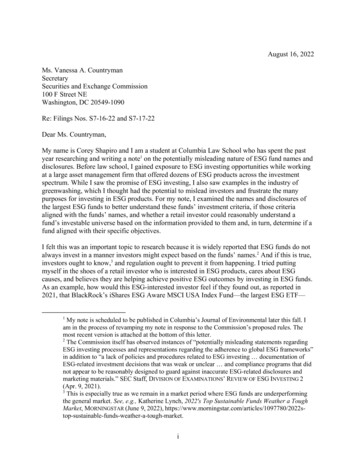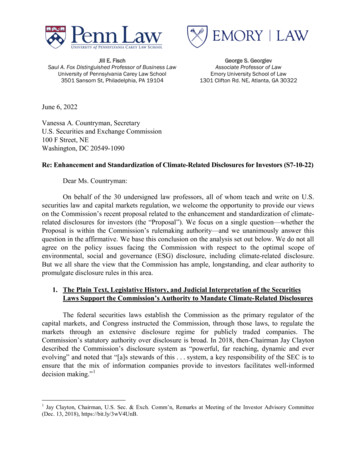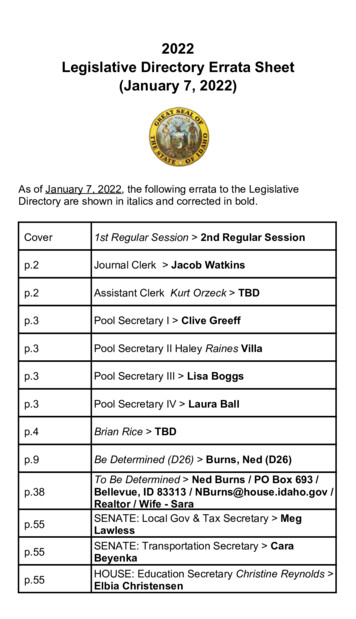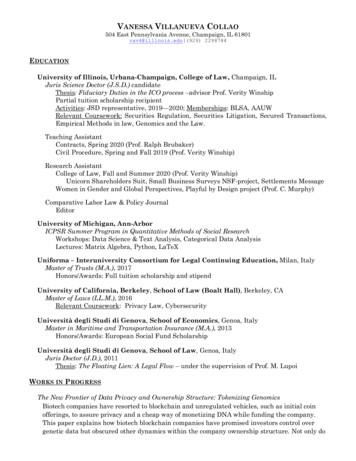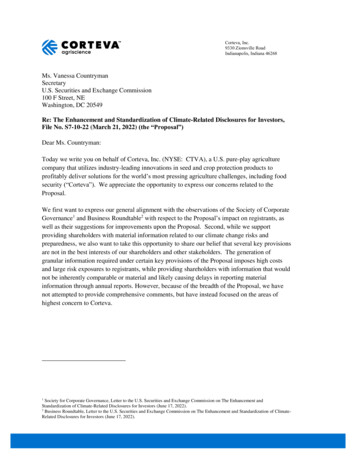
Transcription
Corteva, Inc.9330 Zionsville RoadIndianapolis, Indiana 46268Ms. Vanessa CountrymanSecretaryU.S. Securities and Exchange Commission100 F Street, NEWashington, DC 20549Re: The Enhancement and Standardization of Climate-Related Disclosures for Investors,File No. S7-10-22 (March 21, 2022) (the “Proposal”)Dear Ms. Countryman:Today we write you on behalf of Corteva, Inc. (NYSE: CTVA), a U.S. pure-play agriculturecompany that utilizes industry-leading innovations in seed and crop protection products toprofitably deliver solutions for the world’s most pressing agriculture challenges, including foodsecurity (“Corteva”). We appreciate the opportunity to express our concerns related to theProposal.We first want to express our general alignment with the observations of the Society of CorporateGovernance1 and Business Roundtable2 with respect to the Proposal’s impact on registrants, aswell as their suggestions for improvements upon the Proposal. Second, while we supportproviding shareholders with material information related to our climate change risks andpreparedness, we also want to take this opportunity to share our belief that several key provisionsare not in the best interests of our shareholders and other stakeholders. The generation ofgranular information required under certain key provisions of the Proposal imposes high costsand large risk exposures to registrants, while providing shareholders with information that wouldnot be inherently comparable or material and likely causing delays in reporting materialinformation through annual reports. However, because of the breadth of the Proposal, we havenot attempted to provide comprehensive comments, but have instead focused on the areas ofhighest concern to Corteva.1Society for Corporate Governance, Letter to the U.S. Securities and Exchange Commission on The Enhancement andStandardization of Climate-Related Disclosures for Investors (June 17, 2022).2Business Roundtable, Letter to the U.S. Securities and Exchange Commission on The Enhancement and Standardization of ClimateRelated Disclosures for Investors (June 17, 2022).
Proposed Changes to Regulation S-XWe do not believe that registrants will be able to operationalize the changes proposed toRegulation S-X as currently stated in the Proposal. The estimates, models, and metrics3 requiredunder the proposed Regulation S-X changes, along with the 1% materiality threshold, also presentchallenges and substantial costs on registrants with respect to the development of new policies,operational processes and related controls, financial reporting, as well as with their related auditand internal control assessments.Even if the Proposal were workable, we do not believe these costs burdens are justified throughany benefit to shareholders. Corteva has not received any inquiries from its shareholdersrequesting the level of granularity set forth in the Proposal with respect to its climate changeimpacts or transition risks, and the expenditures related thereto. Additionally, as currentlyproposed, the level of uncertainty around the estimates made will not be clear to shareholders,potentially creating undue reliance on these values. Therefore, we believe that the Commissionshould instead replace the proposed Regulation S-X requirement entirely with an amendment toItem 303(b) of Regulation S-K that would require registrants to consider material climate-relatedimpacts when discussing the results of operations, capital resources, and liquidity. Climate-relateddisclosures would be more meaningful and digestible in the context of management’s discussionand analysis when presented alongside a registrant’s disclosures of other trends, risks and impactsto their financial condition.We believe that this approach will significantly reduce implementation costs while enhancing thequality of disclosures provided to investors by providing shareholders an integrated view of howclimate change risks and mitigation strategies fit into the registrants’ business and strategyoverall. It will also give management an opportunity to make clearer to shareholders thelimitations of management’s estimates and assumptions through a plain English narrative.If the Commission chooses to include these climate-related disclosure requirements withinRegulation S-X, we believe the 1% line-item threshold set forth should be replaced with a generalmateriality threshold taken in the context of the financial statements as a whole, which would beconsistent with U.S. generally accepted accounting principles (GAAP) or other Commission StaffAccounting Bulletins (SAB). A general materiality standard would also be more aligned with the3The Proposal contains certain information gaps around the calculation of metrics, such as the determination of lost revenues withrespect to transition risks and costs savings from climate mitigation activities, and lacks certain implementation guidance, such as howa registrant would determine whether a “severe weather event” constituted a “climate-related event”. Financial impact metrics thatrequire companies to disclose disaggregated information about the impact of climate-related conditions and events and transitionactivities are a new concept under GAAP. Therefore, if the Commission continues to move forward with these disclosures, werespectfully request that the Commission direct the Financial Accounting Standards Board (FASB) to provide further accountingguidance for the implementation these financial statement reporting items.2
materiality standards of the existing Task Force on Climate-Related Disclosure (TCFD)framework, as well as the expectations of our shareholders.4Scope 3 EmissionsWhile the Proposal suggests that the disclosure of Scope 3 emissions “may be useful” toinvestors, we believe that prescriptive and costly disclosure requirements are not appropriate forinformation that may only be useful to certain shareholders or for certain companies. Scope 3emissions by definition are the result of activities from assets not owned or controlled by theregistrant, but indirectly impacting the registrant’s value chain that often the registrant may not beable to influence significantly. 5Because of their indirect nature, registrants, as the Commission acknowledges in the Proposal,often struggle to obtain reliable Scope 3 emissions data and instead must make significantestimates to determine their Scope 3 emissions, which makes these disclosures inherently lessaccurate and useful to shareholders. There are no consistent data sources or methodologies fordeveloping the assumptions utilized in Scope 3 emissions estimates. The Greenhouse Gas (GHG)Protocol, which is utilized by most registrants reporting Scope 3 emissions, permits registrants tomake significant judgments on the inclusion of certain categories of Scope 3 emissions withintheir reporting.6 Due to these judgments, current Scope 3 emissions reporting practices are notSee, e.g., BlackRock, “Proxy voting guidelines for U.S. securities” (January 2022) (“Disclosure of material issues that affect thecompany’s long-term strategy and value creation, including material ESG factors, is essential for shareholders to be able toappropriately understand and assess how effectively the board is identifying, managing, and mitigating risks.”); Legal & GeneralInvestment Management, Corporate Governance & Responsible Investment Policy 2022 (April 2022) (“LGIM focuses on the materialissues that can impact a company’s long-term sustainability, both financially and reputationally.”); State Street Global Advisors,“Global Proxy Voting and Engagement Guidelines for E&S Issues” (March 2022) (“While we believe that sustainability-relatedfactors can expose potential investment risks as well as drive long-term value creation, the materiality of specific sustainability issuesvaries from industry to industry and company by company. With this in mind, we leveraged several distinct frameworks as well asadditional resources to inform our views on the materiality of a sustainability issue at a given company, including :”) (emphasisadded); T. Rowe Price, “Proxy Voting Guidelines”, (October 2021) (“Voting Decision Elements. The following table details thespecific considerations that we take into account when assessing resolutions. Framing Question: 1: Does the resolution address anenvironmental or social issue that is material for this company? In our view, materiality is a key consideration because it issuboptimal to distract the company and its board with resolutions on issues that are not financially material. To determine materiality,we use frameworks specifically designed for that purpose: the SASB and our proprietary Responsible Investment Indicator Model(RIIM)”; Vanguard, “Vanguard Investment Stewardship Policy Insights: Our Perspective on Say on Climate proposals (May 2022) (Inexplaining its approach to “Say on climate” proposals, “[o]ur case-by-case approach to evaluating climate-related proposals isgrounded in our duty to safeguard and grow our clients’ assets. Vanguard expects boards to effectively oversee material climaterelated risks, implement strategies to manage and mitigate risks and seize opportunities, and disclose those risks using widelyrecognized investor-oriented reporting frameworks. We also expect regular reporting, aligned with the TCFD framework, on progressto meet goals . . .”).5E.g., The U.S. Environmental Protection Agency, Scope 3 Inventory Guidance, dance (2022)6Greenhouse Gas Protocol, “Corporate Value Chain (Scope 3) Accounting and Reporting Standard” (“Companies should use theprinciple of relevance when determining whether to exclude any activities from the inventory boundary . . . Companies should alsouse the principle of relevance as a guide when selecting data sources. . . Selection of data sources depends on a company’s individualbusiness goals.”) (September 2011) at 24.43
designed to provide comparability across registrants.7 Additionally, even when receiving suchdata from third parties, it is not typical to receive Scope 3 emissions data within the timelinesutilized for annual reports on SEC Form 10-K.As a result, the voluntary disclosure of Scope 3 emissions remains a minority practice amongregistrants8, and a consistent standard for the calculation of Scope 3 emissions still does not exist.Most registrants reporting Scope 3 emissions today report these emissions on an aggregated basis.Under the Proposal, registrants would be required to identify the categories of upstream ordownstream activities that are included in the Scope 3 emissions calculation, and if any categoryis significant to the registrant, providing separate Scope 3 emissions data for those categories.Corteva has received no shareholder inquiries specifically with respect to its Scope 3 emissionsperformance or Scope 3 emissions data by category.Even when a registrant reports a Scope 3 emissions target, the targeted amount may be animmaterial amount of the registrant’s overall controllable GHG emissions because the ability ofthe registrant to reduce Scope 3 emissions is constrained. While the Commission suggests that aregistrant can influence its Scope 3 emissions by “choosing to purchase from more GHGemission-efficient suppliers” and “working with its suppliers and downstream distributors to takesteps to reduce those entities’ Scope 1 and 2 emissions (and thereby drive reductions in theregistrant’s Scope 3 emissions risks)9, we do not believe that registrants have this poweruniversally and requiring registrants to drive climate disclosure policy through to their suppliersand distributors may have negative business and social consequences.The Proposal, if enacted, will place registrants at a competitive disadvantage to privatecompetitors, who will not need to consider the GHG emissions reporting capabilities of theirsuppliers and will have the flexibility to select suppliers on business fit and cost. To meet thereporting requirements and deadlines set forth in the Proposal, registrants ultimately would bedriven to concentrate their business with larger suppliers who are well-equipped to invest in theinfrastructure for reporting their GHG emissions. Concentrations of supply chains couldultimately make registrants more vulnerable to supply chain risks, including events like theCOVID-19 pandemic and severe weather events aggravated by climate change. Like manyregistrants, Corteva, has a sustainability goal to increase spend with minority and smallersuppliers, which typically have less resources10 to implement the technologies to track andId. at 6 (“Use of this standard is intended to enable comparisons of a company’s GHG emissions over time. It is not designed tosupport comparisons between companies based on their scope 3 emissions. Differences in reported emissions may be a result ofdifferences in inventory methodology or differences in company size or structure.”)8The Conference Board, Disclosing Scope 3 GHG Emissions (February 2022) (finding on 11% of Russell 3000 and 43% of S&P 500companies disclose Scope 3 emissions).9Proposal at 161.10U.S. Small Business Administration, Office of Advocacy, “Small Business Facts: Spotlight on Minority-Owned EmployerBusinesses” (May 2019)(finding 99.9% of minority businesses are small businesses with having 500 employees or less); U. S. Federal74
monitor their GHG emissions. These social sustainability goals would need to be revisitedconsidering the costs of these more stringent reporting constraints that will make it more difficultfor registrants, like Corteva, to do business with them.Downstream Scope 3 emissions can likewise be problematic. There are currently no registrantsthat correspond to the standard identification code (SIC) associated with agricultural production,however, these industries produce most of the raw products used by publicly traded companies.11Most farming operations, particularly family farms, do not have the farm managementtechnologies and expertise to track GHG emissions, which can be aggravated by the lack ofbroadband internet access.12 Further, implementation of these new capabilities by farmingoperations within the Commission’s proposed implementation timeline is unlikely. If Cortevawere required to impose emission tracking requirements on our distributors or consumers, wecould effectively drive small and mid-size farmers out of business and/or lead to moreconsolidation in agriculture, thereby further aggravating existing food insecurity and the ability offamily farm operations to compete.13We ultimately believe that Scope 3 emissions should be excluded from the disclosurerequirements as it is of reduced importance to shareholders, since the ability of the registrant’smanagement to control or influence is constrained and driving such climate reporting measuresmay have unintended consequences on the competitiveness of smaller, non-public enterprises andrun counter to the registrant’s overall business strategy and supply chain security. Whereregistrants are utilizing larger suppliers, the Scope 3 emissions could be repetitive with otherpublicly available sources reporting the suppliers’ Scope 1 and 2 emissions. Therefore, webelieve the Commission should remove the Scope 3 emission disclosure requirements at leastuntil reporting and estimation practices become more standardized and data quality has improvedthrough more cost-effective reporting and tracking mechanisms. In the alternative, we believe theCommission should consider alternatives for emission reporting, including a separate climate andGHG emissions report furnished to the Commission later in the second half of the calendar year.Physical RisksThe Proposal currently requires a level of granularity on physical risks that is unprecedentedincluding the location of the properties, processes, or operations subject to each identifiedphysical risk, including the disclosure of ZIP codes (or subnational postal zone or geographicReserve System, “Small Business Credit Survey: 2021 Report on Firms Owned by People of Color” (finding most firms of color didnot have their financing needs met).11American Farm Bureau Federation, “Overreach of SEC Proposed Climate Change Rule Could Hurt Agriculture” (May 6, 2022).12Id.13Id.5
location if the location does not use ZIP codes). Corteva generally has received very fewshareholder inquiries related to its physical risks from climate change from shareholders, andnever at this level of granularity.We expect this requirement would, as it would for many registrants, pose serious security andintellectual property risks for Corteva, by creating a road map to find key intellectual propertyand assets. The U.S.-China Economic and Security Review Commission recently acknowledgedthat China’s desire to achieve self-sufficiency, as well as to strengthen its own agriculturalindustry, has incentivized the theft of U.S. agriculture assets.14 The theft of our products couldnot only lead to material losses for us and our shareholders, but also enable the development ofversions of American seed lines at a much faster pace, thereby reducing the competitiveness ofU.S. agriculture generally.15 These thefts also create opportunities for the development ofbioweapons using the DNA from genetically modified seeds and crops to harm the U.S.economically and disrupt food security worldwide16.Therefore, we expect the physical risk disclosure would impose increased ongoing costs forregistrants to protect their assets. Shareholders would face increased risk to the return on theirinvestment, and farmers would have their livelihoods put at risk in a manner that increases thethreat to food security.We believe the best interests of our shareholders, as well as the interests of our industry, farmersand other stakeholders is best served by maintaining a principle-led, less prescriptive approach toa physical risk disclosure, and therefore, respectfully request the Commission eliminate theprescriptive requirements to identify the operations, processes, properties, and ZIP location,which would make a registrant’s operations and assets less secure.17Greenwood, Lauren, “China’s Interests in U.S. Agriculture: Augmenting Food Security through Investment Abroad”, U.S.-ChinaEconomic and Security Review Commission Staff Research Report (May 26, 2022)(citing Chinese national who collected thousandsof samples from Monsanto and Pioneer brand testing fields and subsequently shipped them to China so they could be studied andmade into a new hybrid seed for Beijing’s use).15Id. at 8-10.16Id. at 16-17.17Corteva has received consistent interest from investors on the competitiveness and performance of its research and developmentportfolio. The Commission has recognized the significant costs and adverse consequences intellectual property theft has to registrantsand shareholders, including through its recent cybersecurity proposal. SEC Release Nos. 33-11038; 34-94382, “Cybersecurity RiskManagement, Strategy, Governance, and Incident Disclosure” (March 9, 2022) at 9-10 (recognizing investors and companies areharmed by “[l]ost revenues resulting from intellectual property theft and the unauthorized use of proprietary information . . .;reputational damage that adversely affects customer or investor confidence; and [d]amage to the company’s competitiveness, stockprice, and long-term shareholder value.146
Assurance and Timetable for ImplementationWe respectfully request that the Commission reconsider the assurance requirements set forth inthe Proposal, as they are not currently consistent with market practices for GHG emissiondisclosures, and the requirements of climate change reporting frameworks. For example, theProposal would also require registrants to obtain assurance of their Scope 1 and 2 emissions,while the current TFCD does not. Likewise, less than half ( 45%) of S&P 500 companies areproviding assurance on their GHG emissions, and less than 10% of the companies obtainingassurance did so with a public accounting firm. In nearly all such cases, the assurance providedwas limited.18Additionally, particularly due to the high level of estimations and management judgementsrequired to make the disclosures required by the Proposal, we believe the assurance process willbe much more time consuming and costly than currently suggested by the Commission’sProposal. As a reference point, the implementation date of Section 404 of the Sarbanes-OxleyAct was ultimately extended for many registrants due to an under-estimation of the time requiredto implement its requirements. The practice of applying internal controls over financial reportingwas much more mature relative to disclosures under the Proposal, therefore, implying a longerrelative timeline to implement. Because GHG emissions disclosures and the related assurancepractices are developing practices, for both registrants and assurance providers, we expect thepreparation for, and execution of, these assurance engagements to be time consuming and costly.Furthermore, much of the data required for GHG emissions disclosures, is currently disclosed ontimelines much less restrictive than a registrant’s annual report deadline. This will inevitably addto costs and force many registrants to adjust their annual report timelines closer to Commissiondeadlines, thereby delaying shareholders access to other material information and creating greaterrisks of posting delays within EDGAR.If the Proposal were to be adopted with the high-level of disclosure required by the Regulation SX amendments, and/or Scope 3 emissions requirements included, we believe all registrants, alongwith assurance providers, would benefit from a minimum one-year extension of theimplementation deadlines set forth in the Proposal, along with the elimination of providingclimate risk and emission reporting for historical periods prior to the implementation. Thisextension would reduce the risk of reporting delays, give registrants further opportunities toimprove data quality and internal control processes, and work with assurance providers to ensurea more productive assurance process.18See Center for Audit Quality, S&P 500 and ESG Reporting (Aug. 9, 2021).7
Governance DisclosuresThe Proposal also would mandate a high-level of detail with respect to climate changegovernance and risk management around climate matters, to a degree that is not in proportion tomanagement’s internal evaluations of risk that may view other matters of much greatersignificance to the registrant. As an agriculture company, our product innovations are ameaningful part of our response to climate change. Therefore, overly granular disclosures couldharm competitiveness by providing information that would be useful to our competitors. TheProposal’s disclosure requirement regarding whether the registrant’s board of directors has amember with climate expertise would encourage registrants to continue to pursue directors with asingle purpose (i.e., an audit committee financial expert, a cybersecurity expert, and a climateexpert), versus board directors well-versed in a range of areas and well-experienced in strategicimplementation, leadership, operations, and/or the applicable industry expertise. We believeshareholders’ interests in optimizing returns is best served by directors experienced, not only inadvising, but with the skills to oversee management’s incorporation and execution of climatechange risk and mitigation strategies into a registrant’s strategic business plans designed tomaximize shareholder value.19See also, e.g., State Street Bank, “ESG Insights: ESG Stewardship and Engagement for Outsized Impact” (April 30, 2022)(“Toomany companies are still thinking about climate as a separate issue from their long-term strategy. There should be considerableoverlap between how companies are positioning themselves for climate change and their long-term strategy.”; Turner, Natasha, “HowVanguard considers ESG risk”, Investment News. (April 8, 2022)(with Vanguard’s global head of investor stewardship noting “Wehave no agenda beyond shareholder return. That frustrates those who say, ‘How can you say that? Climate change today is anessential crisis, and everyone should be doing everything they can.’ There’s a frustration with lack of governmental action,particularly in the States, and therefore a desire for other entities to step in and do something. We don’t believe that’s the role we canor should play. We are not a solution to a societal challenge that needs governmental action.”)198
ConclusionWe appreciate the opportunity to share our perspective on the Proposal and its impacts onregistrants and agriculture through the comment process. Due to the complexities of theProposal, we encourage the Commission to publish a revised Proposal addressing these concernsand those of others for further comment.Sincerely,David J. AndersonEVP, Chief Financial OfficerCornel B. FuererSVP, General Counsel & Secretary9
Greenhouse Gas Protocol, "Corporate Value Chain (Scope 3) Accounting and Reporting Standard" ("Companies should use the principle of relevance when determining whether to exclude any activities from the inventory boundary . . . Companies should also use the principle of relevance as a guide when selecting data sources. . .





